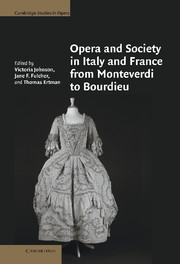Book contents
- Frontmatter
- Contents
- List of illustrations
- List of tables
- List of musical examples
- Notes on contributors
- Foreword
- Acknowledgments
- Introduction: Opera and the academic turns
- I The Representation of Social and Political Relations in Operatic Works
- Introduction to Part I
- 1 Venice's mythic empires: Truth and verisimilitude in Venetian opera
- 2 Lully's on-stage societies
- 3 Representations of le peuple in French opera, 1673–1764
- 4 Women's roles in Meyerbeer's operas: How Italian heroines are reflected in French grand opera
- 5 The effect of a bomb in the hall: The French “opera of ideas” and its cultural role in the 1920s
- II The Institutional Bases for the Production and Reception of Opera
- III Theorizing Opera and the Social
- Bibliography
- Index
5 - The effect of a bomb in the hall: The French “opera of ideas” and its cultural role in the 1920s
Published online by Cambridge University Press: 22 September 2009
- Frontmatter
- Contents
- List of illustrations
- List of tables
- List of musical examples
- Notes on contributors
- Foreword
- Acknowledgments
- Introduction: Opera and the academic turns
- I The Representation of Social and Political Relations in Operatic Works
- Introduction to Part I
- 1 Venice's mythic empires: Truth and verisimilitude in Venetian opera
- 2 Lully's on-stage societies
- 3 Representations of le peuple in French opera, 1673–1764
- 4 Women's roles in Meyerbeer's operas: How Italian heroines are reflected in French grand opera
- 5 The effect of a bomb in the hall: The French “opera of ideas” and its cultural role in the 1920s
- II The Institutional Bases for the Production and Reception of Opera
- III Theorizing Opera and the Social
- Bibliography
- Index
Summary
When considering the great epochs of French operatic history one would scarcely even entertain the notion of including the decade of the 1920s, which pales in comparison with the febrility of Weimar. In fact, our dismissal of the French operas of this decade only appears to reinforce the common dictum of the genre's decline in much of Europe – its ineluctable marginality both in modern culture and in musical life. However, as I shall argue, this apparently insignificant decade in French opera is indeed seminal in terms of the genre's changing function, its evolving intellectual and political role. For opera in France in the twenties became an arena for a new kind of exchange: as a nexus for attempts to enunciate ideology, it led rather to an intriguing effacement of older ideological lines. This, I maintain, was the result of the inherent contradictions of the sub-genre involved, which sought to communicate abstract ideas in a semiotically unstable and emotionally compelling art.
The “opera of ideas,” as I shall call it, emerged from and yet transformed German precedents, fostered by governments of both the Right and the Left in the polarized atmosphere that followed World War I. When articulate ideologically, however, it failed to convince artistically; conversely, the most successful examples led not to reinforcement of certainties but to intellectual ferment.
- Type
- Chapter
- Information
- Publisher: Cambridge University PressPrint publication year: 2007



